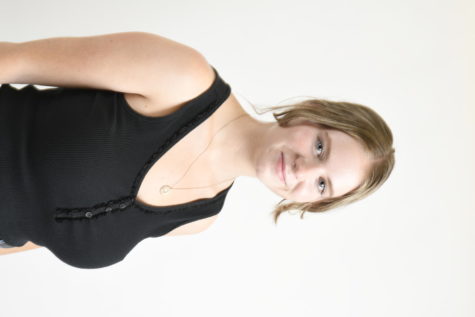Leading a double life
Teacher Salwa Sabet is a part of two different cultures
Growing up in the middle of an Egyptian and Canadian household is what freshman biology teacher Salwa Sabet has been living with since childhood.
Sabet’s mother was raised in Canada and her father grew up in Egypt, which gave Sabet many unusual hardships as a kid.
“I definitely had moments growing up where I felt very lonely and isolated from constantly being in the middle of my parent’s two different cultures and from other people never really understanding the situation I was in,” Sabet said.
Sabet regularly struggled with finding her place in between her family’s two backgrounds.
“When you are apart of two cultures, you identify with both, but never one completely,” Sabet said. “Yes, my dad is Egyptian and that’s a part of me, but I’m not 100% because my mother is also caucasian. And each culture and each side always has certain expectations of you which you feel like you can never completely meet and honestly you don’t know if you would want to either.”
Sabet loved her Egyptian family’s culture, but struggled to keep her pride for her heritage throughout her childhood.
“On the one hand, growing up I loved my Egyptian heritage from overall just loving the culture so much, but I hated having to constantly having to explain myself to other people,” Sabet said. “So for me sometimes it was almost just easier just to blend in and pretend, and just try to not mention it as much as possible and keep it all in.”
Over the past couple years she has continually met more people that grew up in the same situation that she can relate to.
“As I’m getting older and have gone through more and more of these kinds of experiences, I’ve learned that you just have to choose what you feel is right for yourself, and whoever really cares about you will accept that,” Sabet said.
Sabet is now proud of her cultural background, in spite of her past hardships. Sabet now loves visiting Egypt and experiencing the cultural differences.
“The first time I went to Egypt was when I was either seven or eight, and that was a total culture shock for me,” Sabet said. “I am from Ontario, California and was this all American, Californian girl and it was such a new experience for me at the time, but are still some of my favorite memories to this day.”
However, Sabet hasn’t been back to Egypt since she graduated high school.
“When I was around the age of 17 I spent a little under a year in Egypt with my family that still lives there,” Sabet said. “From not knowing exactly what I wanted to do and what I wanted to major in, my dad thought staying in Egypt while making these decisions would be a good experience for me.”
During her stay in Egypt, she lived with her aunts who spoke almost no English which pushed her to really dedicate time into learning Arabic, the official language of Egypt.
“I’m always a little embarrassed to ever speak [Arabic] because my dad never really spoke it at home from my mom not speaking it,” Sabet said. “So I’m not super fluent, but I do know enough to answer and respond to general questions in Arabic and what not.”
While in Egypt though, she went to Arabic school to learn more of the language and was able to practice her Arabic daily with her family.
“Even though my dad did not speak much Arabic at home, I have very vivid memories of being with my dad while all of his friends were over who spoke Arabic, and even though I would not know what they were saying, the intonation and sound of the words always made me feel a sense of comfort,” Sabet said. “And so when I hear other people speak it now, I always feel a connection to it.”
Although it is hard for Sabet to practice and find others who speak Arabic in America, she makes sure to find ways to keep it prevalent in her life.
“I love watching Egyptian dramatic soap operas, which is what everyone watches back in Egypt, mainly because it lets me practice my Arabic,” Sabet said. “But I also just love hearing the sound of people speaking it and the homey feeling it gives me.”
Sabet also does not look Middle Eastern almost at all, but has a completely Egyptian name.
“My dad gave me my name because to him it has a meaning. It was his sister’s name and it was special and important to him,” Sabet said. “But to me as a kid, it was embarrassing from no one being able to say it correctly and everyone always making it into rude words.”
Sabet had rough experiences as a kid from being made fun of for having a “foreign” name, but also for not not being aware of typical American traditions.
“My dad’s muslim, so growing up there was no Christmas or any of those kinds of holidays,” Sabet said. “When kids tried to talk to me about things like Santa Claus, I was always confused and didn’t really understand what any of it was, so now that I’m older, I kind of enjoy celebrating those kind of holidays and decorating my classroom for the holidays because I didn’t get to as a kid.”
And even through growing up and feeling isolated sometimes, Sabet is thankful for the lessons it has taught her throughout the years.
“I always have and will continue to love both sides of my family and value things from both sides of my cultures,” Sabet said. “My family is so important to me and I am so thankful to have them in my life.”



